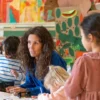![Mt. Juliet Day School Passionately Inspiring Independent Thinkers: From Curiosity to Confidence. Introduction In the formative years of childhood, fostering independent thinking is not merely about achieving developmental milestones; it is about cultivating a lifelong mindset. At Mt. Juliet Day School, independence […]](https://dayschools.org/mtjuliet/wp-content/uploads/sites/6/2025/05/Day-School-2.webp)
Table of Contents
Introduction
In the formative years of childhood, fostering independent thinking is not merely about achieving developmental milestones; it is about cultivating a lifelong mindset. At Mt. Juliet Day School, independence is woven into the fabric of daily learning experiences. Children are encouraged to approach problems, make decisions, and explore new ideas with confidence and curiosity. This early cultivation of autonomy empowers young learners to become active participants in their educational journey, rather than passive recipients of information. By promoting agency, the school prepares children to navigate the complexities of learning and life with resilience and creativity.
Independent thinking at this stage means encouraging children to question, experiment, and draw their own conclusions. Mt. Juliet Day School nurtures these skills through a variety of carefully designed activities that challenge students to think critically and explore solutions independently. This approach builds a strong foundation for self-directed learning, enabling children to trust their instincts and develop a sense of ownership over their educational progress. The school’s educators foster an environment where mistakes are viewed as valuable learning opportunities, further reinforcing a growth mindset.
Why Independence Matters: A Foundation for Lifelong Success
Independence in early childhood is a critical foundation upon which lifelong success is built. Children who develop the ability to think independently often grow into resilient problem-solvers and confident decision-makers, capable of navigating an increasingly complex world. Mt. Juliet Day School recognizes that fostering this independence from a young age not only benefits academic achievement but also cultivates essential life skills such as adaptability, creativity, and self-regulation. These traits empower children to face challenges head-on and to view obstacles as opportunities for growth rather than insurmountable barriers.
Research consistently shows that children who experience autonomy in their learning environments demonstrate higher levels of motivation and engagement. They develop critical thinking skills that allow them to analyze situations, weigh alternatives, and make informed choices. At Mt. Juliet Day School, the emphasis on independence means that students are actively involved in their own learning process, which boosts their intrinsic motivation and curiosity. This intrinsic drive leads to deeper understanding and a genuine love of learning, key components of lifelong educational success.
Beyond academics, independent thinking nurtures social and emotional competence. Children who are given opportunities to make decisions and express their thoughts develop stronger communication skills and emotional intelligence. Mt. Juliet Day School supports children in becoming engaged citizens, able to collaborate with peers, resolve conflicts, and contribute meaningfully to their communities. By prioritizing independence, the school lays the groundwork for students to thrive not only in school but in every aspect of their lives.
Mt. Juliet Day School’s Educational Philosophy
Mt. Juliet Day School’s educational philosophy is deeply rooted in a child-centered approach that celebrates each child’s unique strengths, interests, and learning styles. The school balances structured guidance with open-ended exploration, creating a dynamic and responsive learning environment where independent thinking can naturally emerge. At the core of this philosophy is the belief that children are inherently capable, curious, and competent. By fostering these qualities, the school empowers students to become confident learners who take ownership of their educational experiences.
The curriculum is designed to be flexible and adaptive, allowing educators to meet children where they are developmentally and to tailor learning experiences to individual needs. Mt. Juliet Day School emphasizes hands-on activities and inquiry-based learning that promote active engagement rather than passive reception of facts. This approach nurtures critical thinking, creativity, and problem-solving skills, all of which are essential components of independence. Children are encouraged to explore topics that interest them, engage in meaningful dialogue, and collaborate with peers in a supportive atmosphere.
Additionally, the school places great importance on cultivating a strong sense of community and belonging. Mt. Juliet Day School fosters respectful relationships between students and teachers, creating a safe and nurturing environment where children feel valued and heard. This sense of security allows children to take risks and experiment without fear of failure. Ultimately, the school’s educational philosophy creates fertile ground for independent thinkers to thrive, equipped with the confidence and curiosity to pursue lifelong learning.

Nurturing Curiosity: The First Step Toward Confidence
Curiosity is the essential catalyst that drives meaningful learning and personal growth. At Mt. Juliet Day School, curiosity is actively nurtured as the first and most important step toward developing confidence and independence. The school encourages children to ask open-ended questions such as “why,” “how,” and “what if?”—questions that spark exploration and invite deeper thinking. This inquisitive spirit transforms classrooms into vibrant spaces of discovery, where learners are motivated to seek answers, test hypotheses, and engage in critical reflection.
Classroom environments at Mt. Juliet Day School are thoughtfully designed to inspire curiosity and hands-on engagement. Materials and learning centers are arranged to encourage investigation and experimentation, enabling children to explore concepts at their own pace and according to their interests. Through inquiry-based activities and project work, students develop a natural enthusiasm for learning that strengthens their confidence. The process of seeking knowledge independently builds self-trust and reinforces a growth mindset that values effort and persistence.
Furthermore, the school’s educators play a crucial role in modeling curiosity and supporting students’ questions. Teachers actively listen and respond with encouragement, helping children develop the skills needed to pursue their own learning paths. By fostering a classroom culture where curiosity is celebrated and nurtured, Mt. Juliet Day School helps children transform their natural wonder into the confidence and independence necessary for academic success and personal fulfilment.
Student-Led Exploration: Encouraging Autonomy in Learning
Student-led exploration is a hallmark of the learning experience at Mt. Juliet Day School. Rather than relying solely on teacher-directed lessons, students are encouraged to take the reins of their educational journey. This approach cultivates a powerful sense of autonomy as children pursue their own interests and curiosities. By allowing learners to decide what to explore, how to investigate, and when to share their findings, the school fosters self-motivation and intrinsic engagement.
This autonomy is especially important in early childhood, when young learners are naturally curious and eager to make sense of the world around them. Mt. Juliet Day School creates structured opportunities for children to initiate projects, select materials, and collaborate with peers on shared inquiries. These experiences empower students to develop problem-solving skills and creative thinking, as they navigate challenges and discover solutions on their own terms. It also encourages persistence, as children are more likely to invest effort in topics they choose themselves.
In this learner-centered environment, teachers act as facilitators rather than directors. They observe, guide, and support students’ investigations, asking open-ended questions that deepen understanding without dictating answers. This balance between freedom and guidance helps students feel confident in their abilities and fosters a positive relationship with learning. Ultimately, student-led exploration at Mt. Juliet Day School lays the foundation for lifelong intellectual curiosity and self-reliance.
Creating Choice-Rich Environments for Daily Decision-Making
At Mt. Juliet Day School, providing children with daily opportunities to make meaningful choices is a core strategy for building independence. The school’s classrooms are thoughtfully designed to be “choice-rich,” where students decide what activities to engage in, which materials to use, and how to collaborate with peers. These frequent decisions, though seemingly simple, help develop essential executive functioning skills such as planning, prioritizing, and self-regulation.
Choice-rich environments empower children to become active agents in their learning. When given options, children learn to weigh possibilities, consider consequences, and take responsibility for their decisions. For example, a child choosing between building blocks or a science experiment is practicing autonomy while honing focus and self-discipline. These experiences translate into confidence as students recognize their capacity to influence outcomes and direct their own experiences.
Furthermore, offering choices supports individualized learning by allowing children to engage with activities that resonate with their interests and strengths. Mt. Juliet Day School’s educators carefully curate options that meet developmental goals while honoring children’s preferences. The consistent practice of making decisions also strengthens communication skills, as children learn to articulate their choices and preferences effectively. Over time, this nurtures a mindset of empowerment and accountability.

Role of Teachers as Facilitators and Learning Partners
The role of teachers at Mt. Juliet Day School extends far beyond traditional instruction. Educators serve as facilitators and learning partners, supporting children’s independent thinking by providing scaffolding and guidance tailored to each learner’s needs. This approach respects children’s capabilities and fosters a collaborative learning environment where questions and exploration take center stage.
Teachers actively observe and listen to students, responding with thoughtful prompts that encourage deeper reflection and problem-solving. Instead of supplying answers, they pose open-ended questions like, “What do you think will happen if…?” or “How might you try a different approach?” This strategy nurtures critical thinking and invites children to take intellectual risks in a safe and supportive setting. By acting as co-learners, teachers model curiosity and a growth mindset.
Additionally, Mt. Juliet Day School educators create individualized learning plans that recognize the unique developmental trajectories of each child. They provide just enough support to challenge students without overwhelming them, ensuring progress at a comfortable but ambitious pace. This facilitative role promotes confidence and resilience, as children learn to trust their own ideas and strategies with guidance close at hand.
Project-Based Learning: Building Ownership Through Discovery
Project-based learning (PBL) is a foundational element of the curriculum at Mt. Juliet Day School, designed to deepen students’ engagement through real-world exploration. PBL involves multi-step investigations where children research, create, and present their findings on topics they are passionate about. This immersive process encourages ownership over learning and helps develop complex cognitive and social skills simultaneously.
Through projects like building a mini ecosystem, designing simple machines, or studying local wildlife, students experience firsthand how ideas connect to the world around them. These extended inquiries challenge children to formulate questions, gather information, collaborate with peers, and problem-solve creatively. Mt. Juliet Day School carefully supports these endeavors by providing resources, guidance, and opportunities for reflection and presentation, ensuring that every student’s voice is heard.
The impact of project-based learning extends beyond academic knowledge. Students develop confidence as they master new skills and share their work with others. The sense of accomplishment that comes from completing a meaningful project fosters motivation and a positive self-image. By integrating PBL into daily routines, Mt. Juliet Day School cultivates learners who are not only knowledgeable but also independent, inquisitive, and empowered.
Social-Emotional Growth as a Pathway to Independence
Social-emotional development is a vital pillar supporting the journey toward independence at Mt. Juliet Day School. Recognising that emotional intelligence directly influences a child’s ability to think and act independently, the school integrates social-emotional learning (SEL) into every aspect of the daily routine. From early childhood, students are taught to identify and understand their own emotions, recognise feelings in others, and develop healthy coping strategies. This foundation enables children to approach challenges with calmness and confidence, key ingredients in fostering autonomous decision-making.
At Mt. Juliet Day School, SEL is woven seamlessly into classroom interactions, activities, and community-building exercises. Children engage in guided discussions that emphasize empathy, cooperation, and respectful communication. Teachers model emotional regulation and problem-solving skills, providing students with practical tools to navigate social dynamics and conflicts constructively. For example, role-playing exercises and reflective conversations help children practice self-control and perspective-taking, essential abilities for working independently while collaborating harmoniously with peers.
Moreover, social-emotional competence empowers children to take risks and embrace challenges—critical behaviours in independent thinking. When students feel emotionally secure and supported, they are more likely to venture outside their comfort zones, experiment with new ideas, and persist through setbacks. Mt. Juliet Day School fosters a safe environment where mistakes are normalized as part of learning, encouraging students to view failures as opportunities for growth. This positive mindset, combined with strong emotional skills, creates a powerful platform for children to develop self-confidence and independence that will serve them throughout their academic journey and beyond.

Family Engagement: Partnering to Support Independent Thinkers
At Mt. Juliet Day School, family engagement is seen as a critical component in nurturing independent thinkers. The school actively fosters strong partnerships with parents and caregivers, recognizing that consistency between home and school environments strengthens a child’s ability to develop autonomy. Families are encouraged to participate in their children’s learning journey by engaging in open communication, sharing observations, and reinforcing the values of curiosity and self-confidence at home.
Regular family workshops, newsletters, and conferences keep parents informed about the school’s approach to fostering independence. These touchpoints offer practical strategies for supporting decision-making, problem-solving, and responsible risk-taking outside the classroom. By aligning efforts, Mt. Juliet Day School and families create a unified support system that empowers children to take initiative and grow in confidence.
Moreover, the school celebrates family diversity and individual strengths, incorporating cultural traditions and unique perspectives into classroom experiences. This inclusive approach enriches students’ understanding of the world and reinforces their sense of identity—an important factor in building self-assured, independent learners. Through this collaborative model, Mt. Juliet Day School ensures that children receive the encouragement and guidance necessary to thrive both academically and personally.
Preparing Students for Future Academic and Life Challenges
The skills cultivated at Mt. Juliet Day School—curiosity, problem-solving, and confident decision-making—lay a robust foundation for future academic success and life challenges. Independent thinking equips students to adapt to evolving educational demands, fostering resilience in the face of complex problems and new environments. As children grow, their ability to self-direct learning allows them to navigate middle school, high school, and beyond with greater ease and motivation.
Mt. Juliet Day School’s emphasis on autonomy ensures that students develop not only intellectual competencies but also emotional strength and social skills necessary for collaborative environments. These qualities enable learners to communicate effectively, lead with empathy, and innovate creatively—traits highly valued in higher education and the workforce. By encouraging exploration and self-reflection early on, the school prepares students to be proactive and thoughtful contributors to their communities.
Ultimately, the confidence nurtured through independent thinking empowers students to pursue their passions and goals without hesitation. Mt. Juliet Day School graduates are equipped to face uncertainty with curiosity and courage, making them lifelong learners and engaged citizens who can thrive in a rapidly changing world.
Conclusion.
Mt. Juliet Day School’s unwavering commitment to fostering independent thinkers is evident in every aspect of its educational approach. From nurturing curiosity and providing choice-rich environments to integrating social-emotional learning and family partnerships, the school creates a comprehensive ecosystem that supports each child’s journey from curiosity to confidence. This holistic method empowers students to become self-directed learners who embrace challenges with enthusiasm and resilience.
By prioritizing independent thinking, Mt. Juliet Day School prepares children not just for academic success but for meaningful, fulfilled lives. The school’s philosophy recognizes that confident, autonomous learners are better equipped to innovate, solve problems, and lead in diverse settings. Every classroom activity, project, and interaction is intentionally designed to cultivate these vital skills, ensuring students develop a strong foundation that lasts a lifetime.
As students graduate from Mt. Juliet Day School, they carry with them the tools and mindset necessary to navigate an ever-changing world. The school’s dedication to building independent thinkers is a powerful investment in the future—one that fosters capable, confident individuals ready to make their mark on the world with curiosity and conviction.



